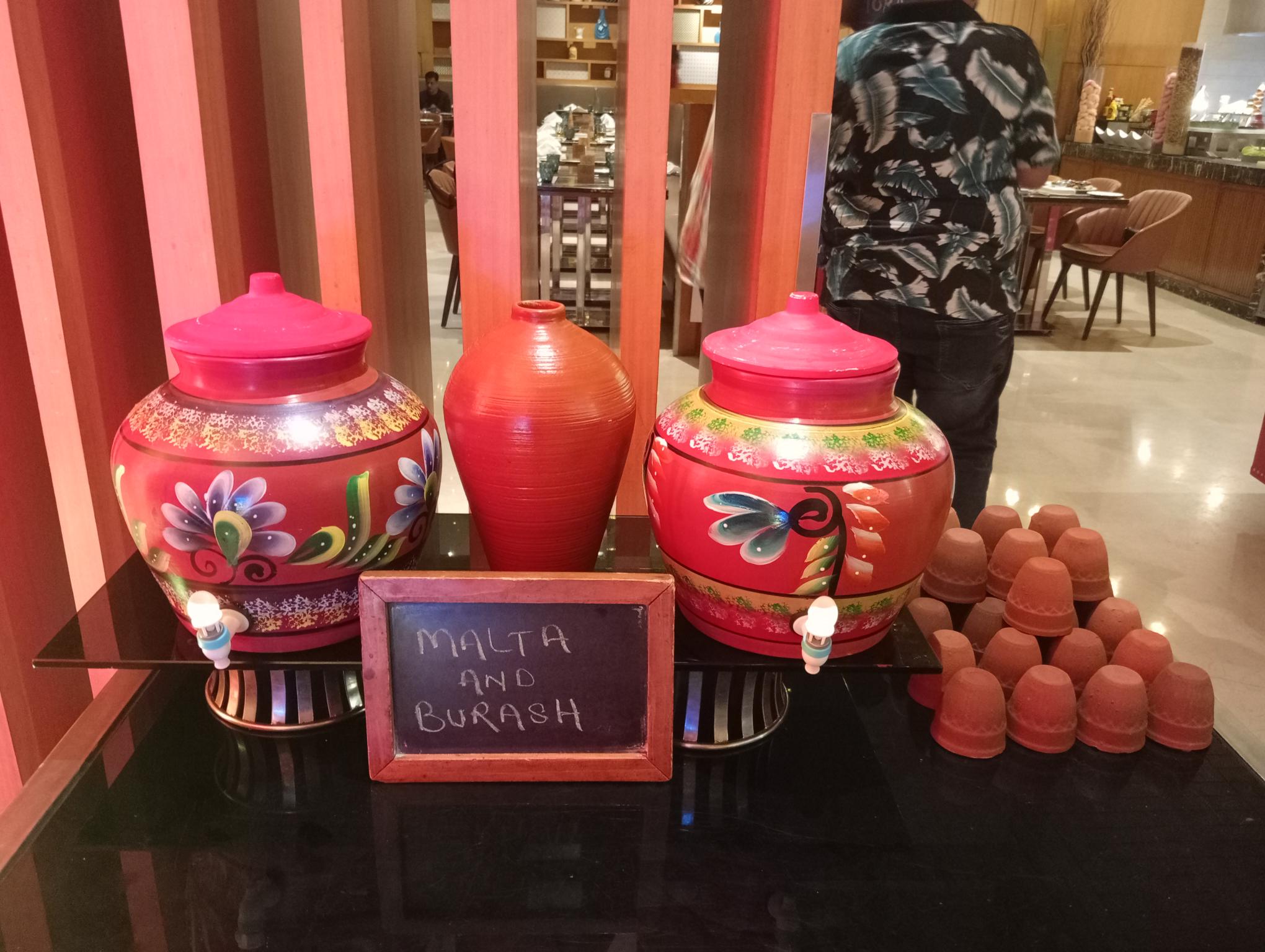
Clay filters containing local drinks of Uttarakhand
A delicious combination of Roat, a sweet flat bread from Uttarakhand made with wheat and fennel seeds, and a light spicy mutton curry, has the power to spell magic on your sensory organs.
Then comes the mandwe ka laddoo — candied ball made of Ragi millet to cleanse your palate with its mild sweetness. While it is unfathomably addictive, it is light on the stomach, dispelling fear of overeating.
If one traverses the hills of Uttarakhand today, one would be largely oblivious to the plethora of meat and fine blend of organically grown grains and vegetables in the traditional cuisine. The omnipresence of Maggi noodles and parathas has forced the local food to disappear from the majority of highway stalls and shops.
“In fact, parathas are never eaten at our homes. Pahadis (people of the hills) survive mostly on millets, lentils and protein. The purpose of our cuisine is to keep us warm and active because we have to perform labour-intensive tasks throughout the day. Food that can make us sluggish is not eaten there,” said chef Rajender Chauhan, who led the ‘Kauthig’ food festival at Holiday Inn, Mayur Vihar.
‘Kauthig’ literally translates to ‘fair’ and so it is. The event is hosting a wide assortment of food that ranges from meat organ fries, savoury millet pancakes, mildly flavoured mutton and chicken curries, and sweets made out of grains.
Decoration resembling the highway
As one enters ‘Cafe on 3’, they are welcomed by graceful musicians, who play local tunes with Pahadi instruments, along with a service of Buransh, a sweet drink made of Rhododendron flowers.
Among the starters are Bhutwa (dry lamb, kidney and liver), Sukhoo Kukdu (dry chicken), Swale (puri), hare pyaz ka chila, mandwe ki roti, gahat ka paratha, chilya roti (sweet bread), and jalebi.
“Nowadays, you will find Pahadi food only at people’s homes. It is not sold outside. Due to over commercialisation of the hills and its politics today, the traditional food is fast disappearing from the public eye. We used to have a culture of animal sacrifice. Before embarking on every auspicious occasion, we still perform animal sacrifice. Earlier, all the temples used to host such sacrifices, but that has been prohibited now. Today, animal sacrifice is banned inside all the main temples in Uttarakhand. Even the vicinity around the temples have been turned vegetarian. In fact, the vegetarian food that we eat differs from what is largely sold in the tourist places around temples,” he said.
While consumption of fish is not much prevalent in the hills, pahadis do relish it once a while as they catch them at river-fronts.
“We get Rohu in our rivers,” he said.
The region thrives on an extensive variety of flowers, pulses and millets, which is used to make breads, desserts and sweet beverages.
“We eat something called Ganth ke soup, which is a kind of daal that has medicinal nutrients and is locally fed to patients ailing from any kind of organ stones,” he said.
To make the meat and fish curries, a condiment local to Uttarakhand is used. Called Jakhya, it looks like fine mustard seeds and is used as tadka in both vegetable and meat dishes. It gives that distinct flavour.
“You will find it only in Uttarakhand, not even in Himachal Pradesh,” Chauhan said.
The curries were complemented with Jhangora (barnyard millet) and Bhaat (broken rice). The locally grown Jhangora is also used to make Kheer.
“The hotel industry across India runs on the labour of people from Uttarakhand. In every region, the kitchen is full of Pahadis, who learn everyone else’s cuisine, without recognising their own food. Therefore, this time we decided to celebrate our staff and their food by organising Uttarakhand cuisine in ‘Kauthig’ food festival,” said the General Manager, Suprabhat.
The festival menu features a range of authentic delicacies, like Garhwali Shikar, Maancha ku Saag, Bhat ki Chutkwani, Jholli, Janguru and many more to choose from.
There is a cyclic menu, part of a buffet for both vegetarian and non-vegetarian guests.
To complement the dining experience, there was a selection of traditional Buransh ka sharbat, Malta ka juice and the sweet delights like Singori, Arse, Bal mithai and many more.
The festival, which began on April 19, will end on April 28.
AQI rises to 208, slipping into ‘poor’ category, according to the Central Pollution Control Board
Dilli 6 – Ishq-e-Dilli at Edesia presents a carefully sequenced journey through familiar flavours from…
Two youth arrested for killing a 55-year-old woman during a robbery in Jyoti Nagar; stolen…
Scheme aims to provide affordable meals to over 1 lakh people daily, with each canteen…
Featuring works by Krishen Khanna and Prabhakar Kolte, the exhibition explores Indian modernism through figurative…
Police are probing the stabbing death of a 36-year-old man found near Sanjay Lake in…